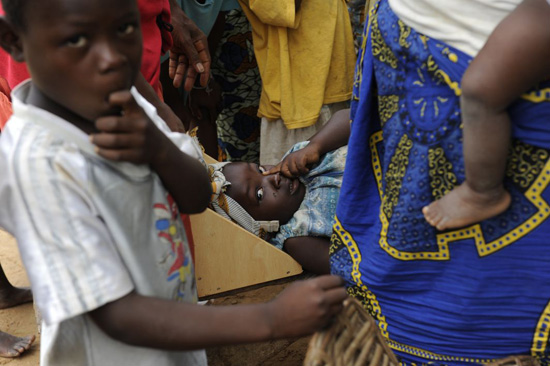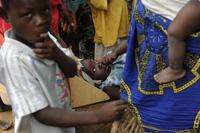Many villages are still empty, their communities hiding in the bush, displaced in camps, or living as refugees in Liberia.

Liberia 2011 © Chris de Bode / Panos Pictures
An MSF mobile clinic in Liberia for people who fled the fighting in Ivory Coast.
The situation in Ivory Coast remains volatile in the west following the post-election violence that wracked the country for several months, intensifying existing inter-communal tensions and land rivalries. Weeks after the conflict began to subside, many villages still lie empty, with their communities hiding in the bush, displaced in camps, or living as refugees in Liberia. The aid response, however, often fails to meet the needs of the most vulnerable people along the critical border areas of both Ivory Coast and Liberia.
“Many displaced people were either victims of brutal violence themselves or witnessed others being slashed, burned or killed,” says Xavier Simon, Doctors Without Borders/Médecins Sans Frontières (MSF) Head of Mission in Ivory Coast. “Some say they knew their attackers, whom they fear may still be near their villages. People tell us they can’t eat or sleep properly and that they suffer from anxiety and heart palpitations. Terrified of further violence or revenge attacks, many choose to remain in hiding or as refugees. Others simply have nothing to return to, as their homes were burnt and their crops destroyed.”
Most health centers are still not functioning in western Ivory Coast. While aid agencies are present in this area, the majority of them confine their operations to the bigger towns or displaced persons camps. As a result, those people hiding in the bush near the border, particularly those between the areas of Blolequin and Toulepleu, do not have adequate access to vital assistance, including food, shelter, or health care.
To reach the displaced people, each week MSF sends mobile medical clinics to 25 locations along the west and southwest of Ivory Coast, in addition to running another 20 mobile clinics along the border counties inside Liberia. In May, MSF mobile teams carried out 5,000 medical consultations in the western Ivorian border area, up to one-fifth of them with people who were still hiding in the bush. MSF is now also extending mobile clinics to areas around Toulepleu and south of Bloléquin to provide increased access to health care. However, only the people who are hiding on the outskirts of the towns—and not deep inside the bush—will be able to reach these.
Across the border, more than 100,000 Ivorians are estimated to have sought refuge in Liberia, with small numbers still crossing each week. MSF teams continue to treat newly arrived refugees in very poor health as a result of the many weeks they spent in hiding. The vast majority of refugees are scattered in Liberian villages close to the border — an area that is chronically food insecure. However, recent MSF visits to several villages in Nimba County reveal that many refugees and host populations outside the officially designated relocation sites have not yet received any food or basic cooking or shelter items. Heavy rains, poor roads and broken bridges are further obstacles to the provision of adequate aid to this widely dispersed population.
“People displaced by violence face an unacceptable lack of options,” notes Simon. “As the hunger gap approaches, refugees in Liberia risk being left without vital assistance unless they move to specific official locations. In Ivory Coast, frightened people in the bush must often make the cruel choice to travel to villages where they don’t feel secure, in search of food or medicine. It’s crucial that emergency aid comes closer to where people have chosen to seek safety.”
The rainy season has resulted in widespread malaria across both Ivory Coast and Liberia. Displacement then brings further health care complications. In the border areas of both countries, more than one third of all MSF consultations are for malaria, including severe malaria, leading to anemia. One of every ten consultations with refugees in Nimba County is for generalized body pain, an indication of the harsh living conditions and the physical consequences of psychological trauma.
Elsewhere in Ivory Coast, MSF continues to provide emergency medical assistance in Abidjan, the economic capital. Here MSF teams assist a vast number of people seeking care for obstetric, medical and surgical emergencies, along with general health care. Since the start of MSF’s emergency response in the Ivory Coast, the organization has provided medical care to 95,000 people inside the country and to 27,000 Ivorian refugees in Liberia.




